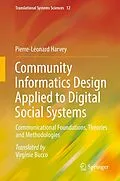This book introduces a Digital Social System Praxis Framework (DSSPF) integrating Computational Media, Evolutionary Systems Thinking and Design Thinking approaches to E-transformation practice, also called Community Informatics Design (CID). The DSSPF framework is intended to create communication spaces dedicated to knowledge production and sharing for social and organizational change. It allows social systems researchers and practitioners to recognize their synergistic roles in the praxis process to shape their future through social innovation projects. This transdisciplinary text provides potential students and practitioners fundamental concepts and tools for such design. It offers resources from the Pragmatic and Systemic philosophy of science for the co-construction of social architectures and infrastructures, and multi-aspectual design methodologies by which government, organizations and civil society can learn to ethically co-design common ground. This approach provides complementary and common patterns from known methods, models, and theories of social systems interventions that could support a generic framing of large scale sociotechnical systems: digital social innovation ecosystem, living Labs, Fab Labs, enterprise collaborative networks.
Autorentext
Pierre-Léonard Harvey studied Communication and Media at University of Ottawa (Bachelor), University of Strasbourg (Master degree) and University of Montreal (Ph.D). He completed his Master's thesis on pedagogy, social psychology and Information and Communication Technology under the direction of Abraham Moles in France in 1981. He also possess a Ph.D degree from the University of Montreal. His 1993 doctoral thesis was on virtual communities modeling and design, social informatics and ICT in the spirit of Rob Kling's socio-technical work. In 1995, he completed further studies on new media and applied communication theory for change in organizational communication. His work on virtual communities applied to e-learning and organization studies in the French speaking worlds are well cited in many peer-reviewed papers and books.
Inhalt
Introduction.- Part I: The Field Of Community Informatics Design Science: Digital Social Systems' Theoretical Foundations.- Universal Anteriorities and Third Phase Science.- Community Informatics Design's Theoretical Basis.- Community Informatics Design in Action: Towards Operational Ways of Thinking in Order to Start a Design Process.- Generic Communication and Community Informatics Design: Evaluation and Validation of Socio-Technical Design of a Universal Communication Platform, the Informatics Design Assistance System, Using the CAPACITÉS Evaluation Model.- Towards a Scientific Collaborative Design Approach: The Construction of a Community Informatics Design Assistance System to Support Communities and Virtual Organizations.- Part II: From Modeling to Implantation the Reference Framework, Instantiation Methodology and the Discovery and Strategic Alignment Matrices.- Reference Model, Governance Framework, and Instantiation Strategy.- An Instantiation Methodology and its Multiple Aspects.- The Discovery and Strategic Alignment Matrices for Socio-Technical Systems' Design.- The Fields and the Definition Taken Into Account for the Construction of the Multimodal and Multi-Aspect Discovery and Strategic Alignment Matrices (2MDSAM) for the DSS Design.- The Organization and Governance of an Incubation and Learning Environment with the Help of Tool Boxes: Reference Model, Community Informatics Design Framework and Instantiation Methodology.- The Conclusion: Towards a Computerized Modeling Tool for a 2MDSAM with Fully Qualified and Assigned Functionalities.
